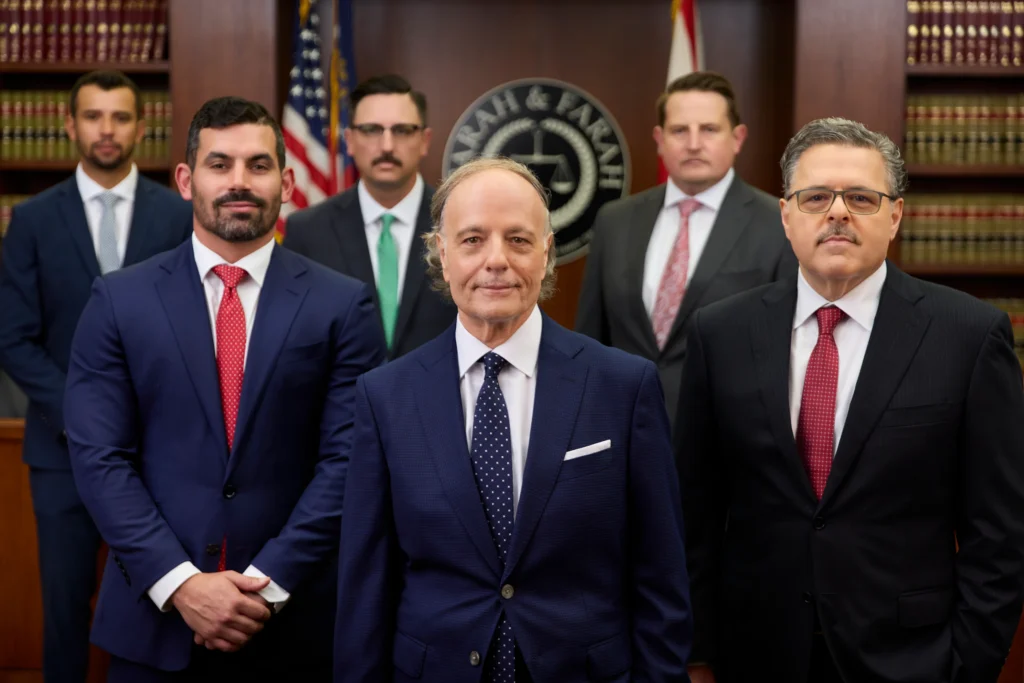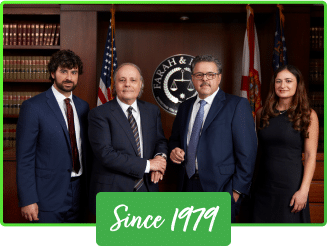Labor Law Attorneys
Labor laws play a major role in ensuring a fair and safe workplace for all employees. These laws are meant to protect employees from discrimination, unfair treatment, unsafe working environments, exploitation, wrongful termination, and more. However, some companies may try to violate these labor laws for their own benefit. If you have been the victim of a labor law violation, don’t hesitate to contact our Florida and Georgia labor law attorneys.

FREE CASE REVIEW
Home > Labor Law Attorneys
Why Should You Consult an Employment Law Attorney?
When labor law violations occur, the consequences for employees can be severe. Lost wages, deteriorating working conditions, and the emotional toll of navigating legal complexities can all take their toll. Seeking redress often means traversing a slow and arduous legal system that may not offer timely solutions.
Before deciding whether a consultation with an employment law attorney is right for you, consider the complexity of your situation, potential risks, and outcomes you wish to achieve. Employment law attorneys experienced and knowledgeable in Florida and Georgia’s unique state laws, such as Farah & Farah’s own T’Keara Watson and Allison Brieter, can help you navigate the process of seeking compensation for any harm that you experienced as a result of labor law violations.
What To Expect With Farah & Farah’s Labor Law Attorneys
Farah & Farah can help you to pursue justice and, if applicable to your situation, compensation for labor law violations, either state or federal, that have harmed you. Whether this harm was financial or to your health and well-being, we’re here for you. Our team of experienced attorneys will work together to provide you with the best possible service and support.
What Are Labor Laws?
Labor laws, also known as employment laws, cover all aspects of the employer-employee relationship, from hiring practices and workplace conduct to workforce reduction and termination. Federal and state laws aim to protect and support employees in the workplace.
What Is an Employment Law Violation?
Employers must adhere to the laws established by federal, state, and local governments to safeguard the workforce under any circumstances. Violating these regulations, whether intentionally or unintentionally, constitutes a violation of employment law.
Employment laws protect against a broad spectrum of possible employment violations, such as those listed below:
Breach of Contract
A breach of contract occurs when one of the parties involved fails to uphold their contractual obligations without a legitimate legal excuse. Both employers and employees can commit a breach of contract and can owe a remedy to the injured party if they do. The consequences of breaching a contract can range from the legal to the monetary.
Breach of contract can include violations of the terms of an employment contract, wrongful termination, non-disclosure agreement violations, and violations of a non-compete agreement.
Discrimination
Discrimination in the workplace is any unfair or prejudicial treatment of someone based on certain protected statuses, such as age, race, gender, religion, sexual orientation, national origin, and disability. Violations of Equal Employment Opportunity regulations, failure to provide reasonable accommodations for a disability, and failure to provide equal pay can also constitute discrimination.
Harassment
Harassment constitutes unwanted behavior that creates a hostile working environment and can be based on a characteristic such as gender, sexual orientation, race, or religion but can be any unwelcome behavior. Unwanted behavior that qualifies as harassment can range from jokes and slurs to threats or even assault and can be perpetrated by co-workers, supervisors, or even a non-employee.
Retaliation
Retaliation is a negative action taken against someone for participating in a legally protected or allowed activity. A legally protected activity in this context can be reporting harassment, filing a complaint, participating in a legal investigation, or being a whistleblower. Federal law prohibits retaliation so that employees don’t fail to report harassment, violations or the law, or other problems out of fear of termination or other retaliation.
Recruitment and Hiring Violations
Labor law violations in the recruitment and hiring process can range from discriminatory hiring practices to failing to properly comply with the Fair Credit Reporting Act (FCRA). The FCRA protects against the misuse of private information. In hiring, a FCRA violation could be mishandling of information discovered during a background check, for example. Discrimination in hiring could range from unfair advertising and asking prohibited questions in interviews to an inequitable selection process.
Safety, Health, and Medical Infractions
A safety, health, or medical infraction can involve a failure to abide by OSHA regulations, violations of the Family and Medical Leave Act (FMLA), or failing to provide workers’ compensation or COBRA insurance when required to. There are laws in place that are designed to protect employees and ensure that they have a safe environment in which to work. Employers are responsible for abiding by those laws and can be held liable if they fail to do so or if they don’t regularly assess working conditions.
Wage Violations
Wage violations in the workplace occur when an employer fails to adhere to laws and regulations governing how employees are paid. These can involve misclassification of employees, unemployment denial, overtime violations, failing to pay minimum wage, withholding wages, failing to pay for breaks, and more.
Federal Labor Laws
The U.S. Department of Labor (DOL) oversees and upholds over 180 federal laws to safeguard the countless American workers vital to our economy.
The Fair Labor Standards Act
The Fair Labor Standards Act (FLSA), crafted by the U.S. Department of Labor, shields employees from unjust wage practices. The FLSA dictates guidelines on minimum wage, overtime compensation, work hours, mandatory recordkeeping, and child labor laws.
Minimum Wage
The federal minimum wage stands at $7.25 per hour. Some states may have their own minimum wage that is at a higher rate than the federal minimum.
Overtime
Eligible employees are entitled to overtime pay at no less than one and a half times their standard pay for hours exceeding 40 per week.
Hours Worked
This encompasses all hours an employee must be on the employer’s premises, on duty, or at a designated work site.
FLSA Record-Keeping
Employers are required to display an FLSA poster and maintain accurate records of employee time and wages.
Child Labor
These regulations aim to safeguard educational opportunities and prevent the employment of minors in conditions harmful to their well-being or health.
Occupational Safety and Health Act (OSHA)
The Occupational Safety and Health Act (OSHA) ensures safety and health standards for public sector employees and applies to most private industry employers. Employers under OSHA jurisdiction must adhere to regulations and safety standards and have a general responsibility under OSHA to furnish employees with a hazard-free work environment.
Employee Protection
Many federal laws exist to protect employees from a wide array of discriminatory actions. Additionally, various laws protect employees who report employer law violations, including measures like job reinstatement and compensation for unpaid wages. These legal provisions are often known as whistleblower protections.
Family Medical Leave Act (FMLA)
Under the Family Medical Leave Act (FMLA), qualified employees working for covered employers can take unpaid, job-protected leave for specific family and medical reasons. Under regular terms and conditions, they maintain group health insurance coverage during this leave.
Eligible employees are entitled to up to twelve weeks of annual leave for purposes such as newborn care, adoption, serious health conditions, or aiding family members on active military duty. Additionally, if they are the spouse, child, parent, or next of kin of a covered servicemember with a severe injury or illness, they can take up to 26 weeks off in a 12-month period to provide care.
Fair Credit Reporting Act (FCRA)
The Fair Credit Reporting Act (FCRA) protects employees by not permitting an employer to use credit reports or investigative consumer reports without the employee or prospective employee’s written consent.
Florida Labor Laws
Florida’s state labor laws are a mixture of statutory regulations, common law, and administrative rulings. Several key pieces of legislation set the tone for employer-employee relations, most notably the Florida Minimum Wage Act, the Workers’ Compensation Act, and state anti-discrimination statutes.
In comparison to federal regulations, Florida’s employment laws afford employees enhanced protections in specific areas. These encompass safeguards against marital status discrimination, an elevated minimum wage, and healthcare continuation mandates for smaller enterprises.
Florida Civil Rights Act
The Florida Civil Rights Act bars workplace discrimination related to protected traits such as:
- Age
- Race
- Color
- Disability
- Marital status
- National origin
- Pregnancy
- Sex
- Religion
Furthermore, in Florida, it is illegal to discriminate against individuals based on their actual or perceived status of having acquired immune deficiency syndrome (AIDS), human immunodeficiency virus (HIV), or sickle-cell trait.
Equal Pay
Florida’s Labor Laws expand the safeguards outlined in the FLSA by prohibiting pay discrimination based on gender even in small businesses with as few as two employees. However, certain scenarios permit wage distinctions based on seniority, merit, productivity, or other relevant factors, excluding gender.
Whistleblower Protections
Florida employers are prohibited from taking any negative employment actions against an employee for revealing or threatening to reveal employer violations to a government agency if the employee previously reported the issue to a supervisor and gave the employer a chance to fix it, providing information or testifying in any investigation, hearing, or inquiry into an alleged violation by the employer, and objecting to or refusing to participate in any activity, policy, or practice that breaches employment laws.
Recruitment and Hiring Safeguards
Florida has implemented various laws to enhance employee protections during the hiring and recruitment processes. Employers in the state have the option to conduct drug tests, although it is not mandated. If a company opts for drug testing, it must furnish the employee with a written policy outlining the organization’s stance on drug use. Moreover, Florida legislation stipulates that all employers must utilize an electronic system, E-Verify, to confirm an employee’s eligibility for employment within three business days of the commencement of employment.
Florida Minimum Wage Act
The Florida Minimum Wage Act currently sets a minimum wage of $12.00 per hour for nonexempt employees. The Act additionally provides provisions for inflation increases. A separate minimum wage rate applies to tipped workers.
Child Labor Laws
Child labor laws in Florida regulate job types, hours, and times minors can work. Restrictions include hazardous jobs for those under 18, with specific limits for those under 16 and 15. 16- and 17-year-olds have work hour limits during school days, although different rules apply during holidays and summer breaks. Meal breaks are required for minors working over four continuous hours.
$2+ BILLION IN RESULTS

Georgia Labor Laws
Georgia is often perceived as conservative in its labor laws. However, Georgia-specific labor laws provide a few distinct protections while mostly aligning with federal labor regulations. Upon examining the relationship between Georgia labor laws and federal statutes, one realizes that, while Georgia defers to federal guidelines for many areas, there are areas where the state provides additional safekeeping for its workforce, such as paid breaks for nursing mothers and structured payment rules that aim to benefit its workforce.
Protections From Discrimination
Georgia has implemented various laws alongside federal anti-discrimination statutes. These include the Georgia Fair Employment Practices Act of 1978, Georgia Sex Discrimination in Employment Act of 1966, Georgia General Age Discrimination Law of 1971, and Georgia Equal Employment for Persons with Disabilities Code of 1981.
These statutes safeguard individuals from discrimination based on color, race, religion, age, sex, national origin, or disability. They prohibit sex-based discrimination within the same workplace and ensure equitable pay for comparable positions. Furthermore, age discrimination against individuals between 40 and 70 is not permitted, especially in roles without age requirements. Lastly, discriminating against individuals with disabilities in terms of wage, pay rate, hours, or employment duration is unlawful unless the disability affects job performance.
Child Labor Laws
Georgia upholds child labor standards governing the employment of minors under 18. These regulations aim to shield young workers from exploitation, prevent overwork, and preserve their health, well-being, and educational prospects. Individuals under the age of 14 are generally prohibited from employment except for specific circumstances such as working under a parent or guardian, engaging in agricultural roles, or providing domestic services within a private household.
Minors’ work hours vary based on age and whether it’s a school week. 16-17-year-olds enjoy flexibility but are restricted from working during school hours. For 14-15-year-olds, work hours are limited to 7 a.m. – 7 p.m. on school weeks and 7 a.m. – 9 p.m. on non-school weeks. Georgia child labor laws place no specific daily or weekly hour restrictions on 16-17-year-olds.
Children 14- and 15 years old can work in certain roles that do not involve hazardous duties. These roles may encompass office tasks, creative pursuits, culinary activities, and retail positions. Georgia child labor laws restrict the employment of 14-and 15-year-olds to those with an employment certificate (work permit), while employers can hire 16-and 17-year-olds without this requirement.
Workers' Compensation
Georgia mandates a worker’s compensation program that provides medical and income benefits to workers who experience work-related injuries or illnesses. This state provision ensures that employees who are hurt on the job can receive timely medical treatments and financial support during their recovery.
In Georgia, employees must file a claim for workers’ compensation benefits within one year of the accident. Workers who have sustained an injury can receive weekly wage loss and medical benefits for up to 400 weeks. However, compensation limits vary based on the injury date, typically covering a portion of the employee’s average weekly wage. If an employee sustains a catastrophic injury, they may receive benefits for life.
Wages Regulations
Georgia law mandates that employers, excluding those in farming, sawmill, and turpentine industries, must promptly compensate their employees on designated paydays, with at least two monthly pay periods. This regulated framework guarantees that employees are paid consistently and punctually for their work.
Termination
In Georgia, it is a distinctive requirement that whenever an employee is terminated from their job for any cause, the employer must complete the “Separation Notice” from the Georgia Department of Labor. This process ensures transparency and formal documentation of the circumstances surrounding the termination of employment.
Working Mothers
Under Georgia labor laws, employers must provide nursing mothers reasonable break time to express breast milk during any period that lasts up to a child’s third birthday. The law stipulates that such breaks should, if possible, run concurrently with any break time already provided to the employee and that the time taken for a nursing mother break will be paid. Also, nursing mothers must be provided with a private location, other than a bathroom, during this break time.
Remedies for Labor Law Violations
Despite the protective measures put in place at both the federal and state level, violations of employment laws are not uncommon. Workplace safety infractions, wage theft, and unjust terminations still occur, leaving employees in vulnerable positions.
When labor laws are violated, employees may suffer from unjust practices and are entitled to seek compensation. For businesses, labor law violations can result in significant financial penalties, reputational damage, and an erosion of employee morale. The penalties for non-compliance can be severe, ranging from back pay for affected workers to hefty fines levied by the state’s labor department.
Breach of Contract
Employees who suffer a breach of contract may be entitled to damages that put them in the position they would have been in had the contract not been breached. This can include back pay, benefits, and sometimes compensation for emotional distress. Potential compensation can include recovery of lost wages and benefits, as well as liquidated damages if stipulated in the contract.
Discrimination
Under the Florida Civil Rights Act and federal laws like Title VII, employees subjected to discrimination based on race, color, religion, sex, national origin, age, disability, or marital status may seek compensatory and punitive damages such as back pay, front pay, compensatory damages, and even punitive damages in egregious cases.
Harassment
The Federal Civil Rights Act and Florida’s Civil Rights Act prohibit different types of discrimination in the workplace. These laws also make it illegal to engage in workplace harassment, whether based on sex, race, or other factors. Harassment that leads to a hostile work environment is not allowed. Remedies can include job reinstatement, back pay, front pay, and compensation for emotional distress.
Retaliation
Employees who are retaliated against for engaging in protected activity, including whistleblowing, may recover damages similar to those for discrimination and harassment, including job reinstatement, lost wages and benefits, and compensation for emotional distress.
FMLA Violations
Violations of the Family and Medical Leave Act may result in the entitlement to recover lost compensation and benefits, interest on lost wages, reinstatement of employment, and damages equal to actual damage sustained by the employee unless the employer can demonstrate the act or omission was made in good faith.
Wage Violations
For non-payment of minimum wage or overtime, the Fair Labor Standards Act (FLSA) and Florida law provide for recovery of unpaid wages, an equal amount as liquidated damages, and sometimes attorneys’ fees.
for the family of a motorcycle rider killed by a driver who ran a red light
for a passenger injured when a truck struck a motorcycle
in the wrongful death of a wife who died in a motorcycle collision with a dump truck
for a rider who suffered a severe leg injury when struck by a car
for a rider injured when a careless driver pulled out in front of the motorcycle
What To Do If You Are Aware of Labor Law Violations
Labor laws are there to protect both the employer and the employee and are designed to ensure a safe and fair working environment. However, sometimes companies will violate labor laws for their own gain at their employees’ expense. If you were one of the numerous people who was affected by an employer breaking either a federal or a state labor law in Florida or Georgia, you don’t have to suffer in silence. Our team of experienced lawyers, including Alison Breiter and T’Keara Watson, is on your side and wants to help you get justice against the company that caused harm.

Contact Farah & Farah’s experienced attorneys today for a free consultation if you’re in need of a labor law attorney in Florida or Georgia. We are dedicated to securing the justice and compensation you rightly deserve. You won’t incur any costs unless your case is successful.
Civil Rights Discrimination Attorneys
Workplace Discrimination Attorneys
Workplace Retaliation Attorneys














FREE CASE REVIEW
